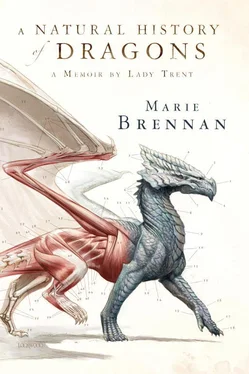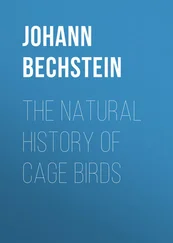Rossi’s mouth twisted. “No. Because he was sniffing around the smugglers too much.” Knife reflecting gold in the light, he advanced a step toward me.
“Wait!” I flung my hand up to stop him—the hand bearing Gritelkin’s ring; not a very wise choice. But there was the faintest chance that my scientific conclusions might do some good. “Please, you must listen. You saw the bones in the cave, didn’t you? Or Khirzoff did. That’s how you knew it was possible to preserve dragonbone after death. You must know they use that cave for a graveyard—the dragons do—they mourn their dead, don’t you see?”
“And what if they do?” he said impatiently.
I doubted a moral argument would sway him, but a pragmatic one might. “That’s why they’re attacking people! I’m sure of it. Because you’ve killed so many of them, and likely because you haven’t let them carry off their dead; it has made them angry. If you continue on like this, more people will die.”
His lip curled, and he answered with disdain. “Peasants.”
His next words were cut off by footsteps, coming in a staccato rush down the stairs. I had never before heard that sound in such a panic, but even so, I recognized my husband’s step.
I opened my mouth to call out—with what words, I will never know—but Rossi had no more patience with intruders. As Jacob came off the stairs, the Chiavoran turned and plunged the knife into his gut.
The horror of that sight paralyzed me, from my hands to my voice. I could not even shriek. But Dagmira was not thus frozen; she had been waiting for Rossi’s distraction, and when it came she moved without hesitation, snatching up a jar and smashing it over the man’s head.
Rossi went down like a felled tree. The chemical that spilled over his head and shoulders was soon joined by more, as he collapsed sideways into the table and then to the floor, taking glassware and the lamps with him.
His fall broke my paralysis at last. Jacob had staggered backward against the wall; I rushed to his side, one hand hovering over the crimson stain that flowered across his shirt. I knew how to draw the body. I did not know how to fix it.
Jacob fumbled in his pocket, came up empty-handed. The motion roused me to my own search; I found a handkerchief and, after brief hesitation, pressed it to the wound. Jacob covered my hand with his own and met my gaze. What he saw there must have alarmed him, for he put on something like a smile and said, “I will be all right, Isabella.”
I would have liked to believe him. But the blood seeping through the handkerchief was hot against my fingers.
From behind me, Dagmira spoke in an unsteady voice. “He is the one who killed Jindrik?”
Rossi. We’d spoken in Chiavoran; she would have understood nothing but the name. I turned enough to put the fallen man in my field of vision, but he showed no sign of rousing. “Yes.” Him, or someone else involved with this scheme. He was the one who had stabbed Jacob, though, and that was more than enough guilt for me.
I had spoken of there being a dragon inside me. For the first time, I felt it not just in the yearning for freedom, but in the predator’s desire for the kill.
Could I have done it? Could I have slipped my hand from beneath Jacob’s, picked up the knife or a shard of glass, and murdered Rossi where he lay?
I do not know. I would like to think not; there is something dreadful about believing one’s nineteen-year-old self could cut the throat of a fallen man, whatever his crimes might be. But I never made the choice: Jacob spoke before I could, and the moment slipped past. I wonder, sometimes, whether he sensed my thoughts in the rigidity of my hand, and intervened before I could resolve myself one way or the other. “Dagmira. Go rouse the others; we must be out of here tonight, before Khirzoff can discover that we have learned his secrets. We’ll meet them at the stables. Isabella, is there anything with which to bind Rossi?”
Dagmira went. Moving like a Hingese automaton, I found a length of rubber tubing, and used Rossi’s fallen knife to cut it into lengths suitable for binding his feet and hands. A few sheets of paper and a third bit of tubing sufficed for a gag. Jacob remained against the wall, not moving to help, and I tried not to think of what that meant. Would he be able to ride?
He must. My task done, I moved to help him up the stairs, but stopped as we reached the bottom step. “Wait—”
Jacob steadied himself as I turned back. Jumping over Rossi’s prone body, I snatched up the Chiavoran’s notebook, and then fetched the first portable bone that came to hand: a wishbone. Proof of what he had done. “ Now we can go.”
Departure, Without Farewells — Searching for Shelter — A Detour to the Ruins — More Answers There, Many of Them Unpleasant — The Arrival of the Dragons
Ialmost turned back at the beginning of our flight, when we had saddled some of Khirzoff’s horses and ruined the tack of the rest, and were set to put that place behind us forever—because a glimmer of light caught my eye.
Steadying my husband in the saddle, I said, very quietly, “Jacob? There is a fire.”
The others heard. Dagmira growled something that might have been “let them burn.” For my own part, I did not realize I’d begun to move until Jacob clutched desperately at my arm. “Isabella—you cannot—”
“There are innocents in there!” I said, too loudly. Softer, but with no less intensity, I went on. “Khirzoff and Rossi may be monsters, but what of their servants?”
Guilt prodded me as much as altruism. I saw my husband’s white, drained face in the night, and knew our hope of survival depended on fleeing straightaway; and yet I could not sacrifice all those men on the altar of our own preservation.
Mr. Wilker growled and flung himself from the saddle, running for the stable, where he had left a watchman—a boy, really—tied up while we stole the horses. A moment later he was back out, setting his gelding into motion even as he spoke. “He’ll rouse the household. You realize this means they’ll be on our trail faster.”
He realized it, too; and yet he had gone. None of us wanted that atrocity on our heads.
It made the nightmare of our flight even worse, though. We could not ride at speed through the mountain night, even with the half-moon to light our way, and although we had done what we could to hamper pursuit, we knew Khirzoff’s men would be following us. No, not even following; they knew where we would go.
Or so they would think. Dagmira and Iljish consulted in quiet whispers too rapid to follow, and then proposed that we go where Khirzoff would not expect: to the ruins. There was the huntsmen’s hut, where Astimir, Lord Hilford, and I had spent the night after our visit, or we could attempt shelter in the ruins themselves. Iljish volunteered to slip into the village on his own, to gather up what he could of our more valuable possessions. Then, I supposed, we would go south. Back to Chiavora, back to Scirland, leaving behind our notes and equipment and Lord Hilford’s beloved armchair—and the people of Drustanev.
It would mean breaking my vow. Dagmira and her brother could spread word of my theory, explaining to their neighbors why the dragons were attacking humans—but what good would it do them? They had no capacity to stop Khirzoff and Rossi, no recourse to any higher authority. Nor did we, not from where we stood. We could perhaps write to the tsar, once we had returned home, but it was a poor excuse for aid. And as little as that would do for their village, it would do even less for Dagmira and Iljish, unless I could persuade them to go with us. Surely Rossi, if he survived, would remember the peasant who broke a jar over his head. They would not be safe anymore.
Читать дальше












